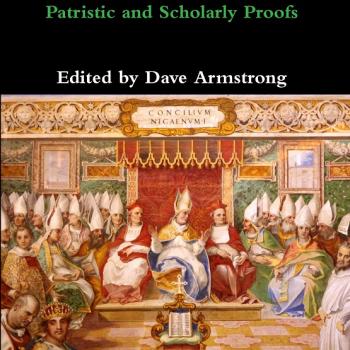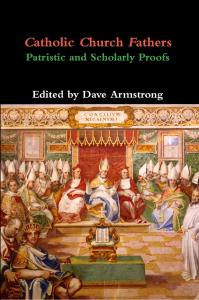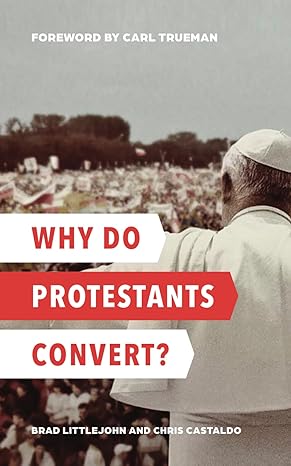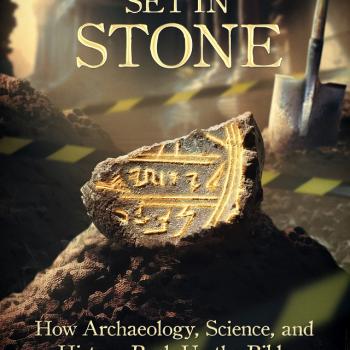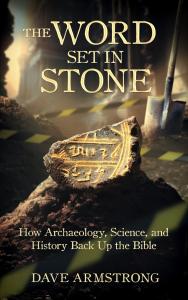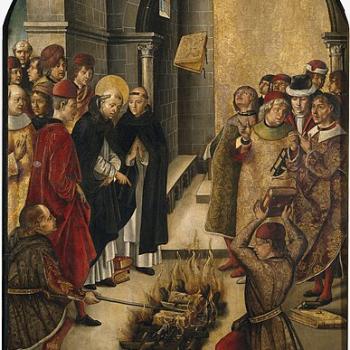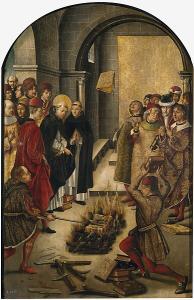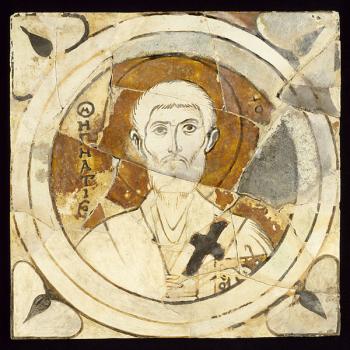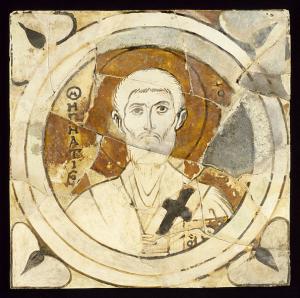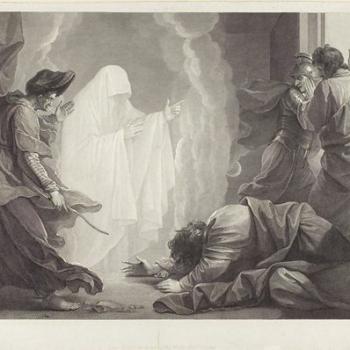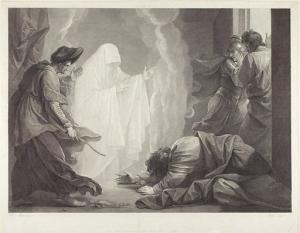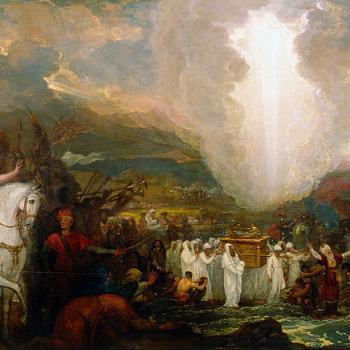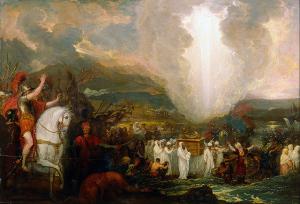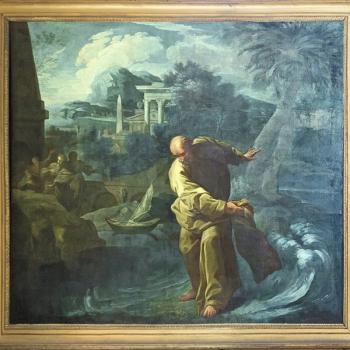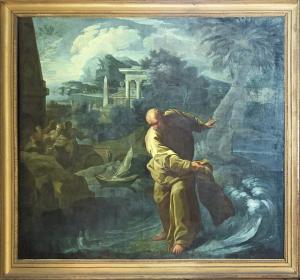Includes Clement of Rome (d. c. 101) & Polycarp (d. 155) vs. Faith Alone
Rev. Dr. Jordan B. Cooper is a Lutheran pastor, adjunct professor of Systematic Theology, Executive Director of the popular Just & Sinner YouTube channel, and the President of the American Lutheran Theological Seminary (which holds to a doctrinally traditional Lutheranism, similar to the Lutheran Church – Missouri Synod). He has authored several books, as well as theological articles in a variety of publications. All my Bible citations are from RSV, unless otherwise indicated. Jordan’s words will be in blue.
This is my 4th reply to Jordan (many more to come, because I want to interact with the best, most informed Protestant opponents). All of these respectful critiques can be found in the “Replies to Lutheran Theologian / Apologist Jordan Cooper” section on the top of my Lutheranism web page.
*****
This is a response to Jordan’s YouTube video, “Sola Fide in the Church Fathers” (3-27-19).
6:54 Let’s talk about the question of the unanimity of the fathers. This is important because when you read a lot of especially popular level Roman Catholic polemics or Eastern Orthodox polemics, you get this idea that there is this unanimous consensus of the fathers on all of these various doctrinal topics.
First of all, “unanimous” in this sense doesn’t mean “absolutely every” but a “strong consensus.” See my article: “Unanimous Consent” of Church Fathers: Not Literally All (Does the Phrase “Unanimous Consent of the Fathers” Allow Any Exceptions?) [4-29-08; revised on 10-22-18]. Nor is it just Catholic and Orthodox “polemics” as to faith alone. It’s also the opinion of three well-known Protestant apologists and scholars:
Whereas Augustine taught that the sinner is made righteous in justification, Melanchthon taught that he is counted as righteous or pronounced to be righteous. For Augustine, ‘justifying righteousness’ is imparted; for Melanchthon, it is imputed in the sense of being declared or pronounced to be righteous. Melanchthon drew a sharp distinction between the event of being declared righteous and the process of being made righteous, designating the former ‘justification’ and the latter ‘sanctification’ or ‘regeneration.’ For Augustine, these were simply different aspects of the same thing . . .
The importance of this development lies in the fact that it marks a complete break with the teaching of the church up to that point. From the time of Augustine onwards, justification had always been understood to refer to both the event of being declared righteous and the process of being made righteous. . . .
The Council of Trent . . . reaffirmed the views of Augustine on the nature of justification . . . the concept of forensic justification actually represents a development in Luther’s thought . . . . Trent maintained the medieval tradition, stretching back to Augustine, which saw justification as comprising both an event and a process . . . (Alister McGrath, Reformation Thought: An Introduction, 2nd edition, Grand Rapids, Michigan: Baker Book House, 1993, 108-109, 115; my italics)
For Augustine, justification included both the beginnings of one’s righteousness before God and its subsequent perfection — the event and the process. What later became the Reformation concept of ‘sanctification’ then is effectively subsumed under the aegis of justification. Although he believed that God initiated the salvation process, it is incorrect to say that Augustine held to the concept of ‘forensic’ justification. This understanding of justification is a later development of the Reformation . . .
Before Luther, the standard Augustinian position on justification stressed intrinsic justification. Intrinsic justification argues that the believer is made righteous by God’s grace, as compared to extrinsic justification, by which a sinner is forensically declared righteous (at best, a subterranean strain in pre-Reformation Christendom). With Luther the situation changed dramatically . . .
. . . one can be saved without believing that imputed righteousness (or forensic justification) is an essential part of the true gospel. Otherwise, few people were saved between the time of the apostle Paul and the Reformation, since scarcely anyone taught imputed righteousness (or forensic justification) during that period! . . . . . (Norman Geisler, Roman Catholics and Evangelicals: Agreements and Differences, with Ralph E. MacKenzie, Grand Rapids, Michigan: Baker Book House, 1995, 502, 85, 222; my italics)
If any one expects to find in this period [100-325], or in any of the church fathers, Augustin himself not excepted, the Protestant doctrine of justification by faith alone, . . . he will be greatly disappointed . . . Paul’s doctrine of justification, except perhaps in Clement of Rome, who joins it with the doctrine of James, is left very much out of view, and awaits the age of the Reformation to be more thoroughly established and understood. (Philip Schaff, History of the Christian Church, Vol. 2, 588-589)
They said it, not me! My question for Jordan would be: how does he explain the sweeping nature of these comments? If they are wrong, how could they be so dramatically wrong? What is it that they are seeing in the fathers that he is not seeing? Catholics have been saying this all along. It’s nothing new to us. Glad to see that some prominent Protestants are now frankly and candidly admitting it.
8:10 we’ve always had this this issue that we haven’t looked at the fathers in terms of their actual context. We haven’t looked at the totality of their writings.
How are Geisler’s and McGrath’s and Schaff’s statements explained then? McGrath is the author of such books as The Nature of Christian Doctrine: Its Origins, Development, and Function (2024), and (especially)
the whole pre-Augustinian era is basically ignored . . . he kind of skips over the whole era.”
McGrath thought the medieval soteriological tradition was wrong in following Augustine, but, as Michael P. Barber noted, in the fourth edition of his book he made a significant admission:
It has become a commonplace in some quarters to suggest that the dik group of terms–particularly the verb dikaioo, “to justify”–are naturally translated as being “treated as righteous” or “reckoned as righteous”, and that Paul’s Greek-speaking readers would have understood him in this way. This may be true at the purely linguistic level; however, the Greek Christian preoccupation with the strongly transformative soteriological metaphor of deification appears to have led to justification being treated in a factitive sense. This is not, however, to be seen as a conceptual imposition on Pauline thought, but rather a discernment of this aspect of his soteriological narrative. . . . Chrysostom’s account affirms the declaration or manifestation (endeixeis) of God’s own righteousness with its actualisation in the transformation of the nature of humanity. (pp. 36-37)
See also, “Alister McGrath’s Conversion on Justification,” Bryan Cross, Called to Communion, 5-5-20 and “Ligon Duncan’s ‘Did the Fathers Know the Gospel?’ “ (Bryan Cross, 7-17-10).
8:49 there are certainly areas where the fathers as a whole are in agreement.
And we think this topic is one of them. Jordan notes that belief in baptismal regeneration and real presence in the Eucharist are two issues where the fathers achieved a “pretty unanimous consensus” (10:59). We agree!
12:08 this is an issue where we do have differences of opinion and we have certain fathers that say certain things [and] other fathers that say other things and trying to kind of tease out what Paul is talking about in Romans and Galatians and Ephesians when he speaks about faith and when he speaks about works and justification by faith, not by works; trying to formulate and figure out how all of those things work together. The fathers do come to some different conclusions in how they understand those texts, so you’re not going to read the fathers and say, “oh look they’re all Lutheran”; you’re also not going to read the father’s and say “oh look they’re all Roman Catholics” or “oh they’re all Eastern Orthodox.”
Well, further below we will be examining some of the earliest Church fathers to see if they believed in a Lutheran / Calvinist / “Reformation”-type “faith alone” soteriology. Sneak preview: they don’t.
12:52 We have to let the fathers be the fathers. We can’t shoehorn the fathers into our own traditions, and I think this is what the Eastern Orthodox and Roman Catholic traditions are often forced to do, because they claim to be the tradition that is consistent with the teachings of the church fathers. Often they try to kind of force this unanimity among the fathers, and I think for that reason they can’t read them consistently in terms of what those figures actually really believed. They can’t read them without bias toward a belief that they already are coming to those texts — which is, “those fathers believed all the same things that we do today.”
Of course (I think it’s obvious), bias about the views of the Church fathers is not by any stretch of the imagination confined to Orthodox and Catholics. I’ve written many times about this. For example:
*
*
Whoever, therefore, trusts that by works he merits grace, despises the merit and grace of Christ, and seeks a way to God without Christ, by human strength, . . . [9]
*
But He who raised Him up from the dead will raise us up also, if we do His will, and walk in His commandments, and love what He loved, keeping ourselves from all unrighteousness, covetousness, love of money, evil speaking, false witness;
not rendering evil for evil, or railing for railing,or blow for blow, or cursing for cursing, but being mindful of what the Lord said in His teaching:Judge not, that you be not judged; forgive, and it shall be forgiven unto you; be merciful, that you may obtain mercy; with what measure you measure, it shall be measured to you again;and once more, “Blessed are the poor, and those that are persecuted for righteousness’ sake, for theirs is the kingdom of God.” [Epistle to the Philippians, chapter 2; added verse numbers removed, but he cites five passages in this section; my italics and bolding]
This is extraordinary! Note the bolded “if.” Our resurrection (which means salvation, since only the saved will be resurrected to glory) is conditional upon doing various works. God will “raise us up” if we “do His will” (a work, especially indicated by the “do”), if we “walk in His commandments” (several works), and if we avoid nine different sins: the avoidance of which amounts to meritorious action and behavior. That’s at least eleven things that are necessary in order for us to be saved and resurrected, followed by five more things that are opportunities for meritorious actions leading (in faith and grace) to salvation.
If St. Polycarp in fact thought like a Protestant (in this regard of salvation), this section would have been much shorter. He would have written something like, “But He who raised Him up from the dead will raise us up also, if we believe in Him in faith alone.” All of the rest would have been relegated to a good and praiseworthy, yet optional sanctification: not related to salvation at all. But Polycarp makes our resurrection conditional upon doing all these good works and behaving the right (Christlike) way. It’s very Catholic and exceedingly unlike Protestantism.
Now, Jordan highlights the fact that Polycarp also wrote about justification by faith. In chapter 1 he states, “knowing that ‘by grace you are saved, not of works,” [Eph 2:8-9] but by the will of God through Jesus Christ” and in chapter 12 he refers to belief in Jesus Christ. Indeed, we must have faith and we aren’t saved by self-generated works. Catholics don’t believe in Pelagianism, or “works-salvation.” We believe in justification through God’s grace by faith (in its initial stage, monergistic): a faith that inherently entails good works, by its very nature, as James teaches — and actually Paul, too, if one looks close enough. These are the good works we are talking about. And Polycarp agrees, for in chapter 1 he also commends the Philippians and remarks that “you have followed the example of true love” and “because the strong root of your faith, . . . endures even until now, and brings forth fruit to our Lord Jesus Christ, . . .”
Catholics can easily harmonize works like these into a schema of justification by grace through faith (which by nature includes works); no problem! But Protestants usually try to highlight the faith part, while ignoring or de-emphasizing the equally biblical works-that-inevitably-flow-from-faith part of the equation. And it’s because they have formally separated faith and works and have (contrary to previous Christian teaching) stuck good works in the separate category of non-salvific, non-meritorious sanctification.
Polycarp expresses the same Catholic soteriology in chapter 3: “For if any one be inwardly possessed of these graces, he has fulfilled the command of righteousness, since he that has love is far from all sin.” And in chapter 4: “let us teach, first of all, ourselves to walk in the commandments of the Lord. Next, [teach] your wives [to walk] in the faith given to them.” And in chapters 5, 9, 10, and 12, he’s also far from any notion of “faith alone”:
[W]e ought to walk worthy of His commandment and glory. . . . If we please Him in this present world, we shall receive also the future world, according as He has promised to us that He will raise us again from the dead, and that if we live worthily of Him,
we shall also reign together with Him,[2 Tim 2:12] provided only we believe. . . .neither fornicators, nor effeminate, nor abusers of themselves with mankind, shall inherit the kingdom of God,[1 Corinthians 6:9-10]. [5]I exhort you all, therefore, to yield obedience to the word of righteousness, and to exercise all patience, such as you have seen [set] before your eyes, not only in the case of the blessed Ignatius, and Zosimus, and Rufus, but also in others among yourselves, and in Paul himself, and the rest of the apostles. [This do] in the assurance that all these have not run [Phil 2:16; Gal 2:2] in vain, but in faith and righteousness, and that they are [now] in their due place in the presence of the Lord, with whom also they suffered. [9]
When you can do good, defer it not, because
alms delivers from death.[Tobit 4:10; 12:9] [10]But may the God and Father of our Lord Jesus Christ, and Jesus Christ Himself, who is the Son of God, and our everlasting High Priest, build you up in faith and truth, and in all meekness, gentleness, patience, long-suffering, forbearance, and purity; and may He bestow on you a lot and portion among His saints, and on us with you . . . [12]
Jordan brings up St. Clement of Rome and his Letter to the Corinthians. The same “faith and works” dynamic that we see in Polycarp very much applies to him, too. In chapter 30 he writes:
Let us clothe ourselves with concord and humility, ever exercising self-control, standing far off from all whispering and evil-speaking, being justified by our works, and not our words.
For what reason was our father Abraham blessed? Was it not because he wrought righteousness and truth through faith?
For, as God lives, and as the Lord Jesus Christ and the Holy Ghost live — both the faith and hope of the elect, he who in lowliness of mind, . . . has observed the ordinances and appointments given by God— the same shall obtain a place and name in the number of those who are being saved through Jesus Christ, . . . [58]
Take heed, beloved, lest His many kindnesses lead to the condemnation of us all. [For thus it must be] unless we walk worthy of Him, and with one mind do those things which are good and well-pleasing in His sight. . . . Let us reverence the Lord Jesus Christ, whose blood was given for us; let us esteem those who have the rule over us; let us honour the aged among us; let us train up the young men in the fear of God; let us direct our wives to that which is good. Let them exhibit the lovely habit of purity [in all their conduct]; let them show forth the sincere disposition of meekness; let them make manifest the command which they have of their tongue, by their manner of speaking; let them display their love, not by preferring one to another, but by showing equal affection to all that piously fear God. Let your children be partakers of true Christian training; let them learn of how great avail humility is with God — how much the spirit of pure affection can prevail with Him — how excellent and great His fear is, and how it saves all those who walk in it with a pure mind. [my italics]*Let us therefore earnestly strive to be found in the number of those that wait for Him, in order that we may share in His promised gifts. But how, beloved, shall this be done? If our understanding be fixed by faith towards God; if we earnestly seek the things which are pleasing and acceptable to Him; if we do the things which are in harmony with His blameless will; and if we follow the way of truth, casting away from us all unrighteousness and iniquity, along with all covetousness, strife, evil practices, deceit, whispering, and evil-speaking, all hatred of God, pride and haughtiness, vain glory and ambition. [my bolding and italics]
Was not Abraham our father justified by works, when he offered his son Isaac upon the altar? [22] You see that faith was active along with his works, and faith was completed by works, [23] and the scripture was fulfilled which says, “Abraham believed God, and it was reckoned to him as righteousness”; and he was called the friend of God. [24] You see that a man is justified by works and not by faith alone.
Genesis 22:15-18 And the angel of the LORD called to Abraham a second time from heaven, [16] and said, “By myself I have sworn, says the LORD, because you have done this, and have not withheld your son, your only son, [17] I will indeed bless you, and I will multiply your descendants as the stars of heaven and as the sand which is on the seashore. And your descendants shall possess the gate of their enemies, [18] and by your descendants shall all the nations of the earth bless themselves, because you have obeyed my voice.”
Or, how will you love Him who has first so loved you? And if you love Him, you will be an imitator of His kindness. And do not wonder that a man may become an imitator of God. He can, if he is willing. For it is not by ruling over his neighbours, or by seeking to hold the supremacy over those that are weaker, or by being rich, and showing violence towards those that are inferior, that happiness is found; nor can any one by these things become an imitator of God. But these things do not at all constitute His majesty. On the contrary he who takes upon himself the burden of his neighbour; he who, in whatsoever respect he may be superior, is ready to benefit another who is deficient; he who, whatsoever things he has received from God, by distributing these to the needy, becomes a god to those who receive [his benefits]: he is an imitator of God. [chapter 10]
When you have read and carefully listened to these things, you shall know what God bestows on such as rightly love Him, being made [as you are] a paradise of delight, presenting in yourselves a tree bearing all kinds of produce and flourishing well, being adorned with various fruits.
***
*
Practical Matters: Perhaps some of my 4,500+ free online articles (the most comprehensive “one-stop” Catholic apologetics site) or fifty-five books have helped you (by God’s grace) to decide to become Catholic or to return to the Church, or better understand some doctrines and why we believe them.
Or you may believe my work is worthy to support for the purpose of apologetics and evangelism in general. If so, please seriously consider a much-needed financial contribution. I’m always in need of more funds: especially monthly support. “The laborer is worthy of his wages” (1 Tim 5:18, NKJV). 1 December 2021 was my 20th anniversary as a full-time Catholic apologist, and February 2022 marked the 25th anniversary of my blog.
PayPal donations are the easiest: just send to my email address: [email protected]. Here’s also a second page to get to PayPal. You’ll see the term “Catholic Used Book Service”, which is my old side-business. To learn about the different methods of contributing (including Zelle), see my page: About Catholic Apologist Dave Armstrong / Donation Information. Thanks a million from the bottom of my heart!
*
***
Photo credit: see book and purchase information for this volume of mine, from 2007.
Summary: Lutheran apologist Jordan Cooper claims that some of the early apostolic Church fathers taught faith alone. I show that Clement & Polycarp do not do so at all.


